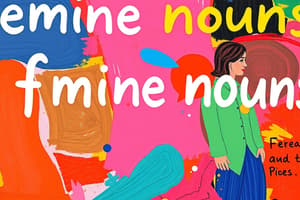Podcast
Questions and Answers
What is the correct form of the indefinite article to use with a plural masculine noun?
What is the correct form of the indefinite article to use with a plural masculine noun?
- Unos (correct)
- Un
- Uno
- El
Which of the following is an example of using the definite article with a singular feminine noun?
Which of the following is an example of using the definite article with a singular feminine noun?
- Una casa
- Unos libros
- Un libro
- La casa (correct)
What is the correct form of the indefinite article to use with a singular feminine noun?
What is the correct form of the indefinite article to use with a singular feminine noun?
- La
- Un
- Una (correct)
- El
When is the definite article 'el' used with a masculine noun?
When is the definite article 'el' used with a masculine noun?
What is the correct form of the definite article to use with a plural feminine noun?
What is the correct form of the definite article to use with a plural feminine noun?
Which of the following is an example of using the indefinite article with a singular masculine noun?
Which of the following is an example of using the indefinite article with a singular masculine noun?
What is the correct form of the indefinite article to use with a plural masculine noun to indicate 'some' or 'a few'?
What is the correct form of the indefinite article to use with a plural masculine noun to indicate 'some' or 'a few'?
Flashcards are hidden until you start studying
Study Notes
Indefinite Articles Usage
- Un (masculine) and una (feminine) are used to indicate an unspecified noun or quantity.
- Used with singular nouns:
- Un with masculine nouns: un libro (a book)
- Una with feminine nouns: una casa (a house)
- Used with plural nouns to indicate "some" or "a few":
- Unos with masculine nouns: unos libros (some books)
- Unas with feminine nouns: unas casas (some houses)
Definite Articles Usage
- El (masculine), la (feminine), and los (plural masculine) / las (plural feminine) are used to indicate a specific noun or quantity.
- Used with singular nouns:
- El with masculine nouns: el libro (the book)
- La with feminine nouns: la casa (the house)
- Used with plural nouns:
- Los with masculine nouns: los libros (the books)
- Las with feminine nouns: las casas (the houses)
- Used with nouns that are already specific or previously mentioned:
- El with masculine nouns: El libro que leo es interesante (The book I'm reading is interesting)
- La with feminine nouns: La casa donde vivo es pequeña (The house where I live is small)
Indefinite Articles Usage
- Un and una are used to indicate an unspecified noun or quantity in singular nouns.
- Un is used with masculine nouns (e.g., un libro meaning "a book").
- Una is used with feminine nouns (e.g., una casa meaning "a house").
- Unos and unas are used to indicate "some" or "a few" with plural nouns.
- Unos is used with masculine nouns (e.g., unos libros meaning "some books").
- Unas is used with feminine nouns (e.g., unas casas meaning "some houses").
Definite Articles Usage
- El, la, los, and las are used to indicate a specific noun or quantity.
- El is used with masculine nouns (e.g., el libro meaning "the book").
- La is used with feminine nouns (e.g., la casa meaning "the house").
- Los and las are used with plural nouns.
- Los is used with masculine nouns (e.g., los libros meaning "the books").
- Las is used with feminine nouns (e.g., las casas meaning "the houses").
- Definite articles are used with nouns that are already specific or previously mentioned.
- El is used with masculine nouns (e.g., El libro que leo es interesante meaning "The book I'm reading is interesting").
- La is used with feminine nouns (e.g., La casa donde vivo es pequeña meaning "The house where I live is small").
Studying That Suits You
Use AI to generate personalized quizzes and flashcards to suit your learning preferences.




